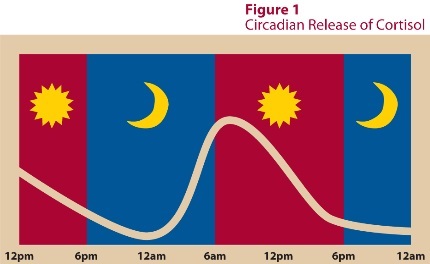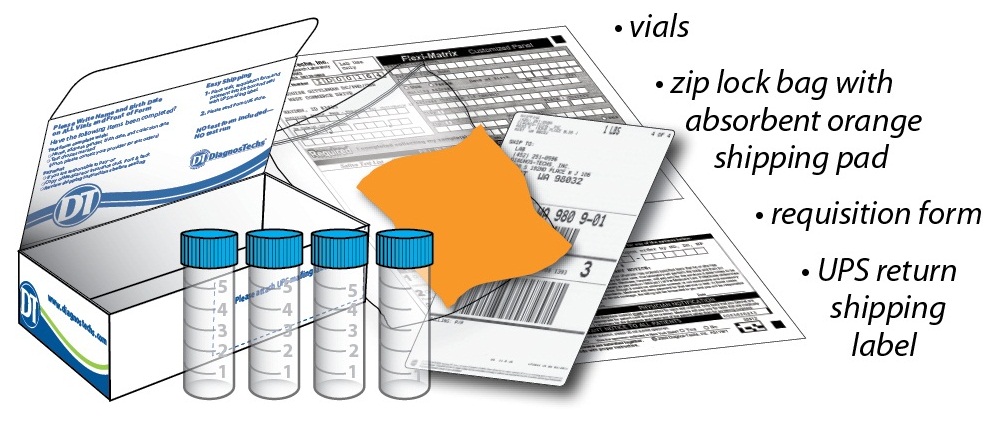 |
 |
 |
 |
ASI Test or Adrenal STRESS Test do you feel tried all the time, can't get out of bed, lost your energy or don't seem to have any lately.If these symptoms sound like you you might be STRESSED out and it's effecting your Adrenal gland. Why not take this easy test that can be taken in the privacy of your home and send the test out by UPS to get the results and finally find out why your tried all the time.
** This price includes preparation and going over the test( 1 hour) with Dr Dietrich with you in person or over the phone.
If your STRESSED all the time you need to know, how it's effecting your health.
The Adrenal Rhythm and Its Importance
The human adrenal glands do not secrete steroid hormones at a constant level throughout the day. The hormones are actually released in a cycle, with the highest value in the morning and the lowest value at night when functioning properly. This 24-hour cycle is called the circadian rhythm and is depicted below in Figure 1.

An abnormal adrenal rhythm can influence many functions of the body, some of which are described below.
Energy Production
Abnormal adrenal function can alter the ability of cells to produce energy for the activities of daily life. People who have a hard time rising in the morning, or who suffer from low energy throughout the day, often have abnormal adrenal rhythms and poor blood sugar regulation.
The maintenance of a stable blood sugar level depends on food choice, lifestyle, adrenal function and insulin activity. The Adrenal Stress Index™ panel measures stress hormones and insulin, to help ferret out the causes of fatigue, cravings and obesity.
Muscle and Joint Function
Abnormal adrenal rhythms are known to compromise tissue healing. Reduced tissue repair and increased tissue breakdown can lead to muscle and joint wasting with chronic pain.
Bone Health
The adrenal rhythm determines how well we build bone. If the night and morning cortisol levels are elevated, our bones do not rebuild well, and we are more prone to osteoporosis. Stress is the enemy of the bones. In postmenopausal women, the effect of stress worsens due to female hormone imbalances.
Immune Health
Various immune cells (white blood cells) cycle in and out of the spleen and bone marrow. The immune system trafficking follows the cortisol cycle. If the cycle is disrupted, especially at night, then the immune system is adversely affected.
Short- and long-term stress is known to suppress the immune response in the lungs, throat, urinary tract and intestines. With reduction in the surface antibody (called secretory IgA), the resistance to infection is reduced and allergic reactions are believed to increase.
Sleep Quality
The ability to enter REM sleep cycles and experience regenerative sleep is interrupted by high cortisol values at night and in the morning. Chronic lack of REM sleep can reduce a person’s mental vitality, vigor and induce depression.
Skin Regeneration
Human skin regenerates mostly during the night. With higher night cortisol values, less skin regeneration takes place. Therefore a normal cortisol rhythm is essential for optimal skin health.
Thyroid Function
The level of cortisol at the cell level controls thyroid hormone production. Often, hypothyroid symptoms such as fatigue and low body temperature are due to an adrenal maladaptation.
Grain Intolerance and Stress Response
Approximately 12-18% of the U.S. population suffers from a genetic intolerance to grains, such as wheat, rye or barley contained in cereals, breads and pasta. A high incidence occurs in people with Celtic, Nordic, non-caucasian and Mediterranean ethnicity. The gut becomes inflamed within 30 minutes after consuming grains, and this can lead to an adrenal stress response, increased cortisol and reduced DHEA.
Chronic Fatigue Syndrome (CFS)
A common HPA axis defect in CFS is impaired corticotrophin release. As a result, low cortisol and eventual adrenal atrophy may be observed. Depleted adrenals with flat rhythms are often seen on the ASI™ panel. Simultaneous use of several therapies can help improve the debilitating effects of CFS.
Glycemic Dysregulation
Chronic hypoglycemia can impair normal adrenal function by repetitive overstimulation of cortisol production. Recurring exposure to high cortisol will impair insulin activity, and invariably lead to insulin resistance and beta-cell exhaustion (diabetes). The ASI™ panel investigates the insulin-cortisol relationship under real-life conditions to allow targeted and meaningful interventions. This panel is useful in the following clinical situations: rapid weight gain and obesity, deranged blood lipids, sugar blues, early diabetes and associated emotional disturbances.
Allergies/Autoimmune Disorders
More than fifty years ago, Dr. W. Jefferies (author of Safe Uses of Cortisol) discovered that patients with environmentally triggered allergies and autoimmune diseases dramatically benefited when given cortisol for other purposes. More recently, German researchers reported that disruption of the adrenal axis and cytokine relationships lead to predisposition and aggravation of autoimmune diseases. The findings of the ASI™ help identify patients with autoimmune diseases and adrenal problems who can benefit from cortisol supplements.
Depression/ADD
Several recent publications report a hyperactive HPA axis in depressed patients. Elevated midnight salivary cortisol is now considered one of the best tests in diagnosing endogenous depression. Other anomalies in cortisol rhythm usually accompany the midnight elevation. On the other hand, cortisol elevations and rhythm disruptions throughout the day are typical of attention deficit disorders (ADD). The anomalous cortisol findings in depression and ADD can be diagnosed successfully with the ASI™. Subsequent interventions to rectify the time-specific cortisol elevations (during the day or night) are usually effective when applied under proper supervision.

The adrenals are two small glands, each weighing 3 to 5 grams, that are located above the kidneys. The adrenals have one of the highest rates of blood flow per gram of tissue, and the highest content of vitamin C per gram of any tissue in the body.
Each adrenal gland is composed of two separate functional entities. The outer zone, or cortex, accounts for 80-90% of the gland and secretes adrenal steroids (cortisol, DHEA-S and aldosterone). The inner zone, or medulla, comprises 10-20% of the gland and secretes the catecholamines (adrenaline and nor-adrenaline). Cortisol, DHEA and adrenaline are the three main adrenal stress hormones.
|
|
 |
 |
 |
 |
 |
 |
 |
 |
 |
 |
 |
How to Use
- Frequently Asked Questions
This section is to provide general information only.
For additional details, please contact your provider directly. Please do not call the lab since we are only able to take medication & supplement calls directly from healthcare providers.
1. How long does it take to process the test?
On average, 5-7 business days from the day it is received.
2. If I collect my sample outside of the designated time frame, will that skew my test results?
Y
You can collect your samples for up to one hour, before or after, the specified times. If you collected more than an hour outside of these times, you will need to recollect all of your samples (unless otherwise instructed by your provider). You do not need a new test kit. Simply discard the cotton from the vials you have already used, rinse the vials with cool water, and let them air dry. On a separate day, collect saliva directly into vials at the appropriate times as described under the “Saliva Collection” section.
3. How much is the test?
For test fees, our fee's are $437.00 this includes going over report/results. (1 Hour consultation). This can be done in person or over the phone. Please do not contact the lab.
4. What if I collect into the wrong vial?
Simply change the labels on the vials in question to match your corresponding collections.
5. If I accidentally have any of the restricted foods, will that skew my test results?
If you consume less than 1 tablespoon of any of the restricted foods, your results will not be skewed. If more is consumed, please recollect (see question #2).
6. I am taking a certain medication or supplement. Do I need to discontinue while doing the test?
Call our office for clarification. Please do not contact the lab.
7. What if I brushed my teeth or consumed food or liquids less than an hour before collecting a sample?
You will need to recollect. Please see question #2.
8. I am a resident of New York State. Can I do testing through your lab?
No
. New York State has additional licensing requirements that we have chosen not to pursue at this time.
Storage & Mailing Instructions
for All Specimens
• Complete the patient portions of the test
requisition form (front and back).
• Write patient’s name and date of birth on all vials.
• Write name and address on top of shipping box.
• Ship samples within 3 days of collection
(keep refrigerated).
• Be sure required test orders are marked on the form.
If they are not marked, please contact your provider for test orders.
• Include check or credit card information and copy of Medicare or insurance card if applicable. Please do not send cash.
• Place vials, requisition form, and payment into
shipping box.
In US Domestic: Tuck front flap into box and seal with UPS mailing label (included in box). Place label within dashed lines and adhere over front edge. Send from your most convenient UPS
location.
Contents
4 Blue-capped 5ml vials containing cotton for saliva collection
Orange absorbent shipping pad
Re-sealable bag
Requisition form
Pre-printed shipping label
(U.S. only)
|
|
 |
 |
 |
 |

|